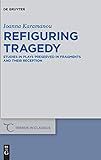Refiguring Tragedy : Studies in Plays Preserved in Fragments and Their Reception / Ioanna Karamanou.
Material type: TextSeries: Trends in Classics - Supplementary Volumes ; 80Publisher: Berlin ; Boston : De Gruyter, [2019]Copyright date: ©2019Description: 1 online resource (XI, 162 p.)Content type:
TextSeries: Trends in Classics - Supplementary Volumes ; 80Publisher: Berlin ; Boston : De Gruyter, [2019]Copyright date: ©2019Description: 1 online resource (XI, 162 p.)Content type: - 9783110659740
- 9783110660005
- 9783110661279
- online - DeGruyter
- Issued also in print.
| Item type | Current library | Call number | URL | Status | Notes | Barcode | |
|---|---|---|---|---|---|---|---|
 eBook
eBook
|
Biblioteca "Angelicum" Pont. Univ. S.Tommaso d'Aquino Nuvola online | online - DeGruyter (Browse shelf(Opens below)) | Online access | Not for loan (Accesso limitato) | Accesso per gli utenti autorizzati / Access for authorized users | (dgr)9783110661279 |
Browsing Biblioteca "Angelicum" Pont. Univ. S.Tommaso d'Aquino shelves, Shelving location: Nuvola online Close shelf browser (Hides shelf browser)
Frontmatter -- Preface -- Contents -- Abbreviations -- Introduction -- Part I: Inter-dramatic Dialogues -- ‘All’s well that ends well’: Euripides’ response to Sophocles’ Antigone -- Alope’s legend and its dramatic refigurations -- Tragedy into Comedy: Euripides’ Alcmeon in Corinth as a source text of Menander’s Periceiromene -- Part II: Tragedy through Aristotelian Spectacles -- Exploring Aristotle’s Poetics as a source for lost tragedies -- Aristotle’s reception of the lysis in Theodectes’ Lynceus: Remarks on Poet. 11, 1452a 27–29 and 18, 1455b 29–32 -- Part III: Iconographic Reception -- The representation of Euripides’ Dictys in South Italian painted pottery -- The reception of Euripides’ Alexandros in Etruscan iconography -- Part IV: Performing Fragments -- Euripides’ Alexandros in performance -- Bibliography -- General Index -- Index of Passages Discussed
restricted access online access with authorization star
http://purl.org/coar/access_right/c_16ec
This book brings together case studies delving into different, unstudied aspects of the Nachleben of selected lost tragedies either in their once extant form or in their fragmentary state in later periods of time. It seeks to explore the ways in which the plays in question were reworked, discussed, represented or reperformed within varying frameworks. Notably enough, research on the reception of tragic fragments could yield insight not only into the receiving work, but also into the facets of the source text that have attracted attention in its subsequent refigurations. It could thus shed light on the ideological and cultural routes through which these fragmentary tragedies were received by the poet, the scholar, the artist, the viewer, the reader and the spectator in each case. The complex process of the refiguration of a fragmentarily preserved play within different contexts could form a yardstick of its cultural power and elucidate the dynamics of fragmentation in modern times. Τhe volume is of particular interest to scholars in the fields of classics, reception, cultural and performance studies, as well as to readers fascinated by Greek tragedy and its vibrant afterlife.
Issued also in print.
Mode of access: Internet via World Wide Web.
In English.
Description based on online resource; title from PDF title page (publisher's Web site, viewed 28. Feb 2023)









